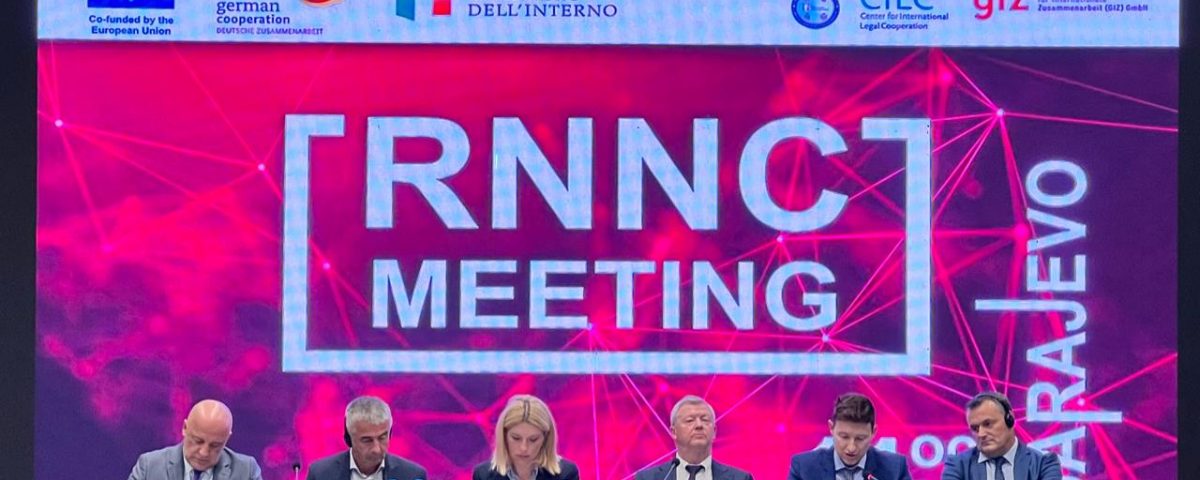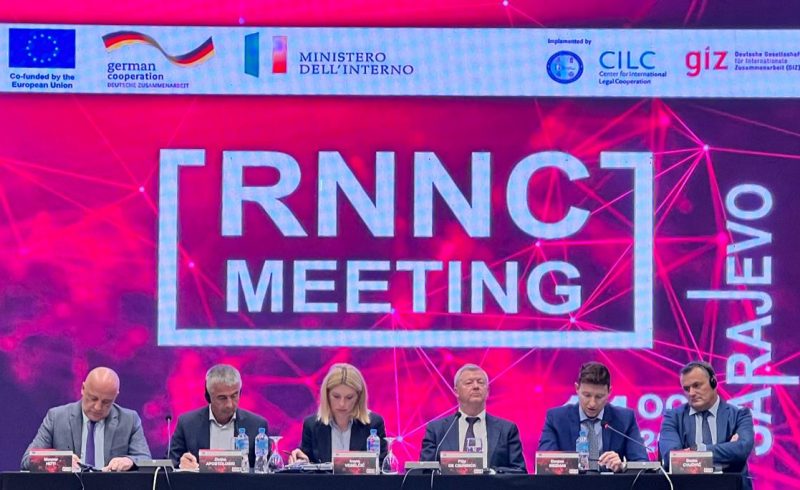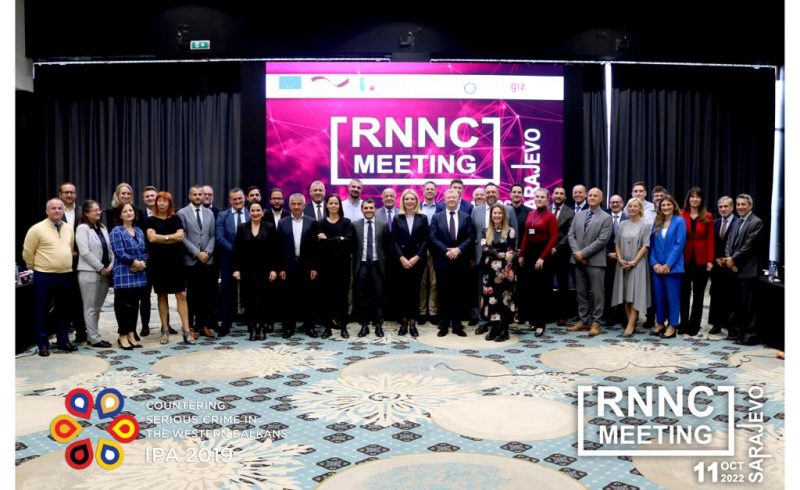Publisher: Cve.gov.al 11/10/2022
Denion Meidani: “Joint Regional Doctrine” of the fight against Violent Extremism and Terrorism.

Denion Meidani: “Extremism undermines peace and security, human rights and sustainable development”
04/10/2022
Regional Steering Committee Meeting “Building Institutional Capacity in the Western Balkans to Address Challenges Related to the Reintegration, Resocialization and Rehabilitation of Returned Foreign Terrorist Fighters (RFTF) and Their Families”
12/10/2022Denion Meidani: "Joint Regional Doctrine" of the fight against Violent Extremism and Terrorism.
The sixth meeting of the Regional Network of National Coordinators of the Western Balkans of war Against Violent Extremism and Terrorism held today in Sarajevo. This meeting, moderated by Mr. Filip De Ceuninck, Regional Advisor on Terrorism, took place under the special auspices of the European Union, GIZZ, the Ministry of the Interior of the Republic of Italy and the authorities of Bosnia and Herzegovina and was hosted by the National Coordinator of the War Against Extremism of Violence and Terrorism of Albania Mr. Denion Meidani, National Coordinator of Kosovo Mr. Mensur Hoti, National Coordinator of North Macedonia Mr. Zlatko Apostoloski, National Coordinator of Serbia Mr. Darko Cvijovic and National Coordinator of Bosnia and Herzegovina, Mrs. Ivana Veselcic.
After the war in Ukraine and various hybrid threats that affect not only the Western Balkans, the joint fight against Violent Extremism and Terrorism remains a priority which is treated with special care and in absolute cooperation throughout the region. The role of the states in the implementation of strategies and action plans of the fight against violent extremism and terrorism, the role of states in bilateral agreements in the field of counter-terrorism, activities against violent extremism and terrorism and Russia’s unjustified involvement in unprovoked aggression in Ukraine , were the main pillars of this meeting.
In her opening speech, the Deputy Minister of Security at the same time and National Coordinator of Bosnia and Herzegovina, Mrs. Ivana Veselcic emphasized the fact that regional cooperation is essential for the common fight against violent extremism and terrorism. Terrorist financing, money laundering and serious crimes are also issues that affect our countries and that must be taken into consideration when drawing up our respective action plans and strategies.
Further, the activity continued with the speech of the Director of the Coordination Center for Countering Violent Extremism and the National Coordinator of Albania for these issues, Mr. Denion Meidani, who proposed the adoption of a common strategy and doctrine for the fight against violent extremism and terrorism.
“We are all gathered here today because we know very well that extremism is the enemy of peace and security, human rights and sustainable development. It has undermined our collective efforts towards maintaining peace and security, promoting sustainable development, protecting human rights, promoting the rule of law. Making them even more difficult today due to pandemics and the war in Ukraine and their subsequent crisis. All these are key moments in today’s international
geopolitics, that test their very structure. Their medium and long-term economic impact is significant. Their shockwaves have already cost countries years of socio-economic progress, led to an increase in national debt around the world and further damaged international trade flows, relations and sub-politics.
Today, in many countries around the globe, extremist groups continue to exploit social fractures to spread violent ideologies, strengthen their organizational capabilities, and ultimately expand into new geographies. They adapt to changing landscape and shape to accommodate the actors involved. These groups have turned to our countries repeatedly testing them as fertile grounds to spread their narrative, brainwash wrongful individuals and form hateful beliefs and behaviors.
Although recognizing the intellectual appeal of such discussions, the very concrete policy implications for it are actually more critical. Any attempt to predict the evolution of the threat drives the design of strategy and the allocation of resources in a certain direction. Our current institutional reforms and actions have highlighted a hesitancy regarding the desired priority focus of the “Prevention Strategy”. Predicting the future of violent extremism has never been an easy task. A simple observation of recent trends and numbers is an unreliable method of predicting deeper structural evolution. To address this point, we need to discuss here today the concepts of new waves of extremism in our countries, whether state-sponsored or right wing, with a view to reflecting what threat landscape may lie on the horizon. We certainly need a new regional doctrine and new national paradigms. A new philosophical and theoretical framework within which the theories, strategies, laws and action plans carried out in support of them are properly formulated.
To defeat the terrorism of tomorrow, we must address the long-term, underlying drivers that enable the growth and spread of extremism today. Our mission today is to research and deliver new, meaningful and rigorous integrated solutions. Through several sets of tools and multi-agency efforts.
It is indeed a world of complex challenges; we must use our combined efforts as a catalyst for social and economic engagement against extremism. After reforming our skilled teams and establishing strategic partnerships such as those with the EU, GCERF, IOM, IISG, OSCE, we must continue to contribute to creating a better future where extremism is no longer a threat to societies, strategic interests of states and common human values….” Meidani said, among other things.
In his speech, the National Coordinator of the Republic of Kosovo, Mr. Mensur Hoti, after making a summary of the current situation of returnees from Syria and Iraq in Kosovo, as well as the preparatory work that is being done in the preparation of the action plan and strategy against violent extremism and terrorism, supported the idea of Mr. Meidani for the creation of a common doctrine for fighting against terrorism and violent extremism in the Western Balkans.
Mr. Zlatko Apostoloski, National Coordinator of North Macedonia, said that North Macedonia is at the final phase of drafting the strategy and action plan, and I think we should include the opinions and proposals of the pre-speaker colleagues. This is a common struggle for all our countries. Faced with this threat, we must be “one” and without any division.
In his speech, the National Coordinator of Serbia, Mr. Darko Cvijovic emphasized that regional cooperation in the common fight against violent extremism and terrorism is a priority of the institution he leads. In addition, Mr. Cvijovic stated that the Republic of Serbia is also working on the drafting of the new strategy and action plans for this purpose, as well as the rehabilitation and reintegration plan of the returnees.
The meeting will continue for the next three days addressing various issues of the joint action plan for P/CVE and CT.
Albania is represented in this meeting by Mr. Denion Meidani, Director of the Coordination Center for Countering Violent Extremism, Mr. Ermal Jauri, Head of the Division for Civil Society and Security Affairs and Mrs. Alketa Gaxha, IOM representative for Albania. Also in the activity were representatives of the Anti-Terror Office of the Council of Europe, ISGS Sarajevo, CEPOL, GIZZ, CILC, GCERF, etc



